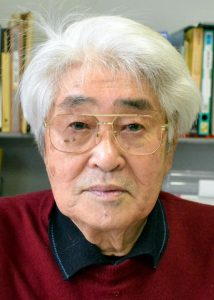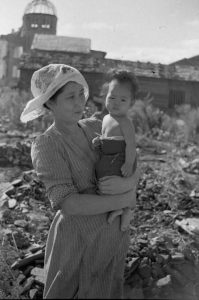Documenting Hiroshima 80 years after A-bombing: In summer 1947, mother struggles to raise six children near A-bomb Dome after losing husband
Jan. 27, 2025
by Kyosuke Mizukawa, Senior Staff Writer
In the summer of 1947, citizens could be seen working to rebuild their lives in the incinerated ruins near the badly damaged Hiroshima Prefectural Industrial Promotion Hall (present-day A-bomb Dome), located in the central area of Hiroshima City. One such person was Chieko Ise, who was in her 30s at that time. She had lost her husband in the atomic bombing and needed to raise her four sons and two daughters on her own.
“My mother had a strong spirit. After the atomic bombing, she gathered us together and said, ‘Starting today, your mother is going to become a man.’ She must have felt that at the time if she didn’t think that way, we would not survive,” recalled Eiichi Ise, 87, her fourth son, who was 10 years old at the time and now lives in Hiroshima’s Naka Ward. One of the photographs taken by Shunkichi Kikuchi, a photographer who captured scenes in the city center two years after the atomic bombing, shows Chieko lovingly holding her second daughter, who was born in December 1945 and still only one year old.
Oldest brother also killed
Before the bombing, Eiichi’s father, Shinichiro, had managed a cosmetics production and sales shop named Iseya Shoten, located in the area of Sarugaku-cho (in Hiroshima’s present-day Naka Ward). It is said that when sumo tournaments were held, young wrestlers would visit the shop to purchase hair oil for tying their topknots. The Industrial Promotion Hall was just a stone’s throw away and served as a playground for Eiichi. He said, “I used to be scolded when I ran around inside the building in Japanese wooden sandals.”
With air raids intensifying throughout Japan, the mother and children of the Ise family were evacuated to the village of Kameyama (in Hiroshima’s present-day Asakita Ward). On August 4, 1945, they returned to Sarugaku-cho for a memorial service held for deceased relatives, and on August 5, they went back to the village. Eiichi’s father, who saw them off at the station, said to his mother, “Take care of the kids.” Those were the last words Eiichi heard his father speak.
On the morning of August 6, Eiichi’s father, 47 at the time, was taking part in building-demolition work near the Hiroshima City Hall. Around August 10, Chieko took Eiichi and the other children into the city, but they were unable to locate even the remains of his father. Eiichi’s oldest brother, Hirokichi, 17 at the time, a first-year student at the former Hiroshima High School (present-day Hiroshima University) who had not been evacuated, also died in the bombing.
With their house completely obliterated, their life changed drastically. The family managed to make ends meet by selling antiques his grandfather had collected and doing other work. About one year after the bombing, they built a house in the ruins just east of their former house, marking their return to that area.
Making a living with general store
Eiichi’s family and their neighbors supported each other to get by. He said, “Our house was a humble wooden building that lacked even a desk for studying. But it did have a bath, which was rare in that area.” The staff from the nearby Shima Hospital, which was at the hypocenter, would visit the house to take baths, and in return, they would bring boxes of sweets they had received as gifts from their patients.
His mother, Chieko, started a general store to make a living, desperately selling soap and cleaning equipment. Eiichi, who had wept continuously about the death of his father and brother after the bombing, eventually helped to support his family by delivering milk. Around four or five years after the atomic bombing, the family business changed to sales of tobacco. Involved in the business since he was in his 20s, Eiichi still runs the shop today. His mother died in 2005 at the age of 92.
A video of Chieko’s testimony recorded six years before her death remains at the Hiroshima Peace Memorial Hall for the Atomic Bomb Victims. “We had no money, food, or even a house. Even today, I can’t forget the suffering we experienced at that time,” she explained in the video.
Chieko recalled the days after the bombing in such a way, but her pride in having lived through that time with her children is evident in the tone of her voice. “I decided to raise my children no matter what,” she said. “I didn’t care how many tears I had to shed for living a life of poverty. However, from tears of poverty, flowers bloom.”
(Originally published on January 27, 2025)
In the summer of 1947, citizens could be seen working to rebuild their lives in the incinerated ruins near the badly damaged Hiroshima Prefectural Industrial Promotion Hall (present-day A-bomb Dome), located in the central area of Hiroshima City. One such person was Chieko Ise, who was in her 30s at that time. She had lost her husband in the atomic bombing and needed to raise her four sons and two daughters on her own.
“My mother had a strong spirit. After the atomic bombing, she gathered us together and said, ‘Starting today, your mother is going to become a man.’ She must have felt that at the time if she didn’t think that way, we would not survive,” recalled Eiichi Ise, 87, her fourth son, who was 10 years old at the time and now lives in Hiroshima’s Naka Ward. One of the photographs taken by Shunkichi Kikuchi, a photographer who captured scenes in the city center two years after the atomic bombing, shows Chieko lovingly holding her second daughter, who was born in December 1945 and still only one year old.
Oldest brother also killed
Before the bombing, Eiichi’s father, Shinichiro, had managed a cosmetics production and sales shop named Iseya Shoten, located in the area of Sarugaku-cho (in Hiroshima’s present-day Naka Ward). It is said that when sumo tournaments were held, young wrestlers would visit the shop to purchase hair oil for tying their topknots. The Industrial Promotion Hall was just a stone’s throw away and served as a playground for Eiichi. He said, “I used to be scolded when I ran around inside the building in Japanese wooden sandals.”
With air raids intensifying throughout Japan, the mother and children of the Ise family were evacuated to the village of Kameyama (in Hiroshima’s present-day Asakita Ward). On August 4, 1945, they returned to Sarugaku-cho for a memorial service held for deceased relatives, and on August 5, they went back to the village. Eiichi’s father, who saw them off at the station, said to his mother, “Take care of the kids.” Those were the last words Eiichi heard his father speak.
On the morning of August 6, Eiichi’s father, 47 at the time, was taking part in building-demolition work near the Hiroshima City Hall. Around August 10, Chieko took Eiichi and the other children into the city, but they were unable to locate even the remains of his father. Eiichi’s oldest brother, Hirokichi, 17 at the time, a first-year student at the former Hiroshima High School (present-day Hiroshima University) who had not been evacuated, also died in the bombing.
With their house completely obliterated, their life changed drastically. The family managed to make ends meet by selling antiques his grandfather had collected and doing other work. About one year after the bombing, they built a house in the ruins just east of their former house, marking their return to that area.
Making a living with general store
Eiichi’s family and their neighbors supported each other to get by. He said, “Our house was a humble wooden building that lacked even a desk for studying. But it did have a bath, which was rare in that area.” The staff from the nearby Shima Hospital, which was at the hypocenter, would visit the house to take baths, and in return, they would bring boxes of sweets they had received as gifts from their patients.
His mother, Chieko, started a general store to make a living, desperately selling soap and cleaning equipment. Eiichi, who had wept continuously about the death of his father and brother after the bombing, eventually helped to support his family by delivering milk. Around four or five years after the atomic bombing, the family business changed to sales of tobacco. Involved in the business since he was in his 20s, Eiichi still runs the shop today. His mother died in 2005 at the age of 92.
A video of Chieko’s testimony recorded six years before her death remains at the Hiroshima Peace Memorial Hall for the Atomic Bomb Victims. “We had no money, food, or even a house. Even today, I can’t forget the suffering we experienced at that time,” she explained in the video.
Chieko recalled the days after the bombing in such a way, but her pride in having lived through that time with her children is evident in the tone of her voice. “I decided to raise my children no matter what,” she said. “I didn’t care how many tears I had to shed for living a life of poverty. However, from tears of poverty, flowers bloom.”
(Originally published on January 27, 2025)









